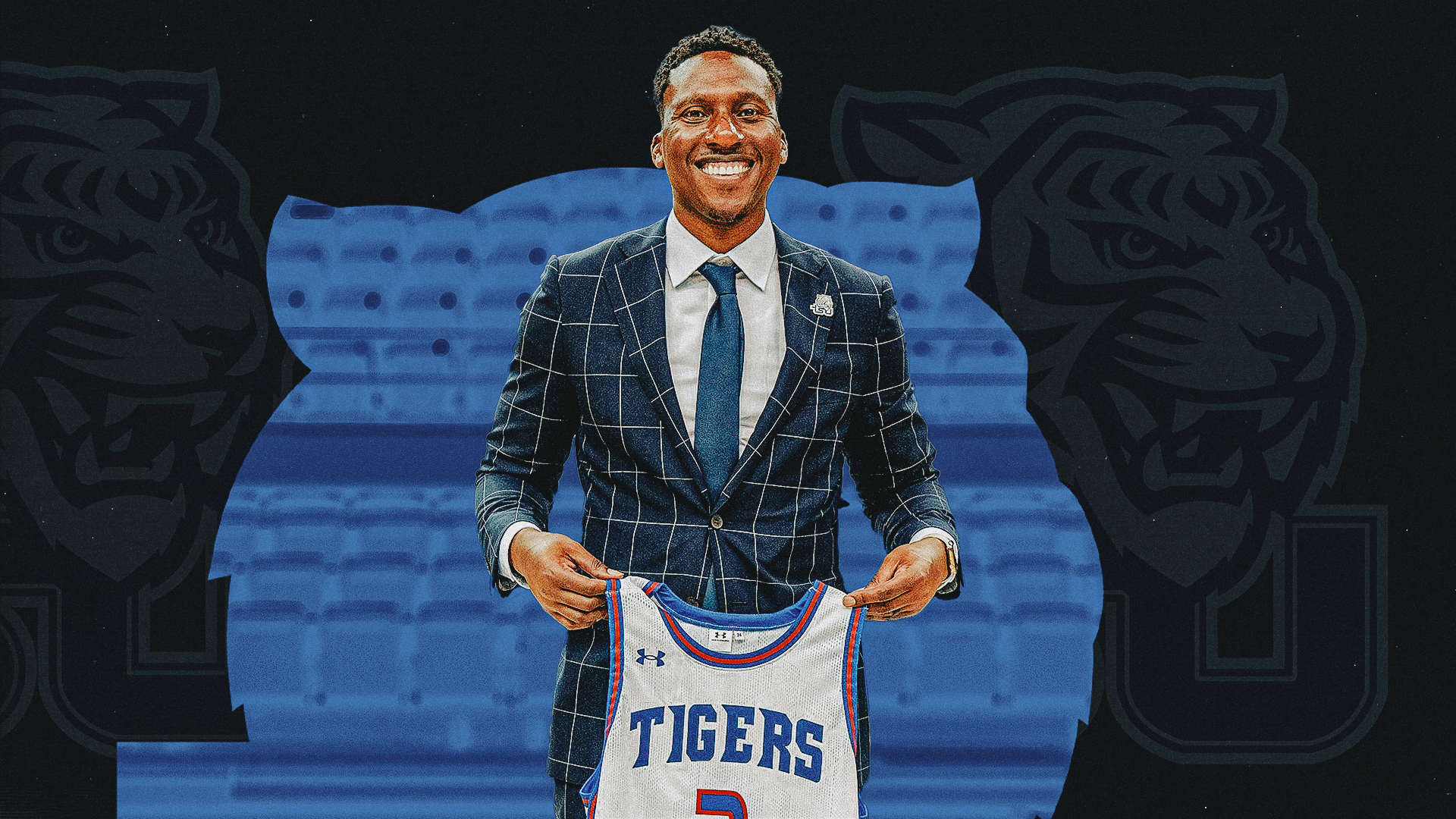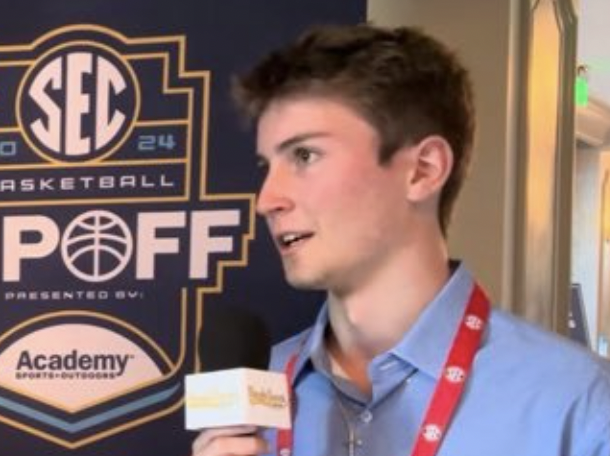NASHVILLE — The look of a grizzled head coaching veteran in complete command jumps out upon a glance at Tennessee State's Nolan Smith, who stands there at mid court with a blue Tennessee State Nike shirt tucked into his joggers. Smith has never walked around and been the guy before this, though—that was generally the prerogative of Mike Krzyzewski, Penny Hardaway and Kenny Payne—but there he is running the show as the head guy and hoping to get Tennessee State back to the NCAA Tournament for the first time since 1994 with the look of his coaching mentors.
Tennessee State’s first-year head coach will inevitably have his share of learning on the job to do, but he's at least got the look down at this point. The other thing he's got going for him before he ever coaches a game; whatever he doesn’t understand about his current role he can easily recite about any other role within his program.
He’s lived all of them.
Smith led Duke to a national championship in 2010 as its savvy point guard before heading to the NBA as a first-round draft pick. He worked with compliance and organized travel as the low man on the totem pole and Duke’s director of basketball operations from 2018 to 2021 after initially rejoining the program as the special assistant to the head coach. Smith was eventually elevated to assistant coach at Duke in 2021 and held the same role at Louisville and Memphis before taking the Tennessee State job in July.
“It’s one of things that just prepared me to be in this position,” Smith told Basket Under Review. “It also helps you steer everybody to make sure your program is running the right way, running at extremely high level, but also gives everyone the freedom once given the guidelines and how to work to be themselves.”
Smith knows that for Tennessee State’s bet on him to pay off, he can’t be Krzyzewski, Payne or Hardaway. The Tennessee State coach calls their tutelage a “blessing,” but knows it can’t be the only thing he has going for him. He’s got to be himself just like he’s encouraging his staff to be.
The former high-major assistant will look to emulate aspects of the discipline Krzyzewski instilled within his teams, he’ll also look to be as intentional as his former head coach. Perhaps he’ll mix in a conditioning drill from Payne or a recruiting strategy from Hardaway.
He’s got to be his own man for this to work, though.
“I think when you get your first job you have to be yourself,” Smith said. “At the end of the day I’m going to be coach Nolan Smith through and through.”
Tennessee State wing Travis Harper Jr. jokes that some of Smith’s end of practice speeches sound like they’ve been formulated from Krzyzewski’s mouth. Smith is hardly as blunt as his former head coach, though.
Harper describes Smith as “chill, but when it’s crunch time, not chill.” A glimpse into Smith channeling some Krzyzewski-like intensity includes him threatening to finish an October practice with 30 minutes of running if his team doesn’t get its act together in the huddle. The more often present version of the Tigers head coach stands behind the play at mid court and takes everything in until the play is finished without constantly stepping on toes and barking out commands.
When his team is working with the proper intensity, Smith takes a second to unexpectedly stand uncomfortably next to a free throw shooter to apply some pressure as a reminder that he’s the one who makes the rules around here.
“I wouldn't think he was a first-time head coach,” Tennessee State point guard Khalil London told Basket Under Review. “Practices are well ran, are organized, the standard is very high.”
Smith’s standards thus far aren’t all that difficult to decipher.
If he has it his way, his team is going to build its identity on the defensive end. It’s going to compete in everything it does. It’s not going to make excuses because it has a first-year head coach, either.
“It’s win now everywhere,” Smith said. “I’m very fortunate to come to a team that's been well put together, added a couple good additions, so now I go from there. Just trying to create a winning culture, winning environment, to make sure every single thing we do is about competing, getting after it and playing the right way to win games.”
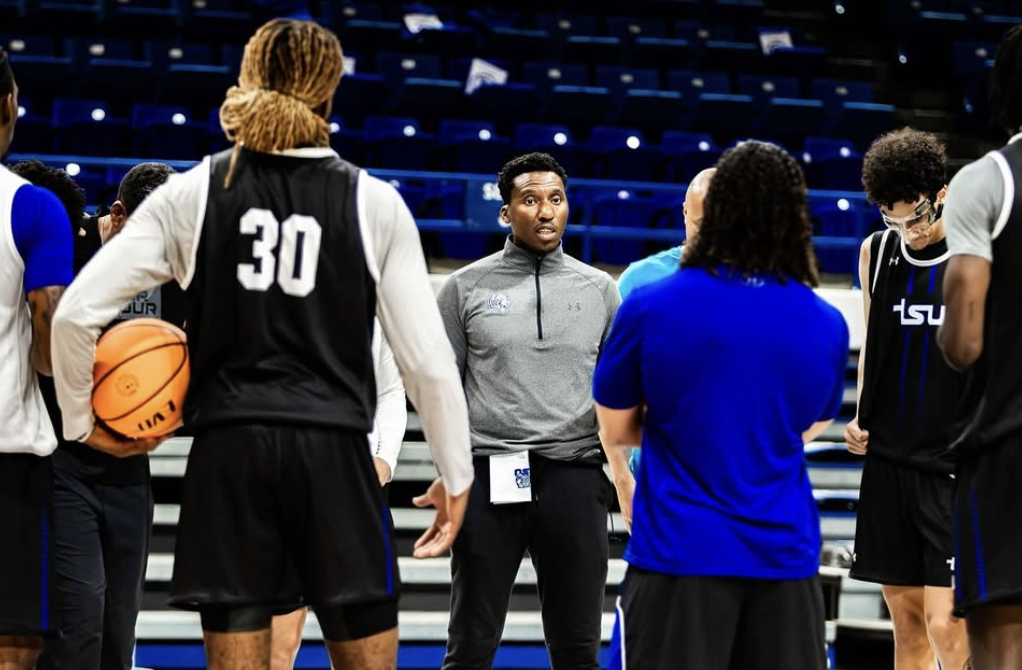
This Tennessee State team could have plenty of reason to pout and shy away from expectation because of the circumstances that they’re in. They lost their head coach Brian “Penny” Collins to an assistant coaching job with the Memphis Grizzlies on June 30 and didn’t have a named head coach until July 18.
All but one of its current players committed to play under Collins and were left in the dark when he decided to depart from the program. Perhaps most won’t admit it, but Harper speaks for the team and admits that he and his teammates were “kind of anxious” about the change they faced.
“It was pretty shocking,” Tennessee State swingman Aaron Nkrumah said. “It was kind of like a punch in the face at first. We didn’t know what was going to happen. We didn’t know where we were going to be within the program.”
Nkrumah, London and Hunter all vocalized that Collins’ exit didn’t stir up any hard feelings from his team and that they understood the move he decided to make. Nkrumah and Hunter chalk Collins’ exit up to being “part of the business" nowadays, Hunter says he’s “proud” of the former Tigers head coach.
Life has to go on in the post-Collins era, though. When Smith walked in the door, Tennessee State’s players had an opportunity to exit. They all told him they were in, though.
They never got to choose the first-year head coach and he didn’t get to choose them, but they had to make it work. Smith only knew one way to go about doing that.
“He just kept it real,” London said. “I feel like he really didn't need to win us over. The group we have, like, we were just so locked in. We’ve known what we’re supposed to do ever since we lost last year. Penny started us off, and [Smith] just had to finish the job.”
The sort of self-motivation that has driven Tennessee State’s eight returners to come back can be pinpointed to its 71-69 loss to SIU Edwardsville in the OVC Tournament. A win that day would’ve sent Collins’ team to the OVC Championship, but the night ended in an outing that felt like a microcosm of Tennessee State’s season. It was close, but not quite good enough.
Nkrumah says that Tennessee State team believed a championship was in play. An injury to leading scorer Brandon Weston in early February as well as London suffering a torn ACL in the preseason forced it to think about what ifs rather than titles, though.
They’ve come back with a mission, though. Smith wasn’t around to feel the hurt that the eight returners on his team felt in early March, but it didn’t take long for them to believe that he was going to push them to get over the edge like Collins would have.
“We had our meeting and we figured out that he just wants the same goal that we want,” Harper said. “We all want a championship. We got close last year, so we want to do the same thing this year and get that ring.”
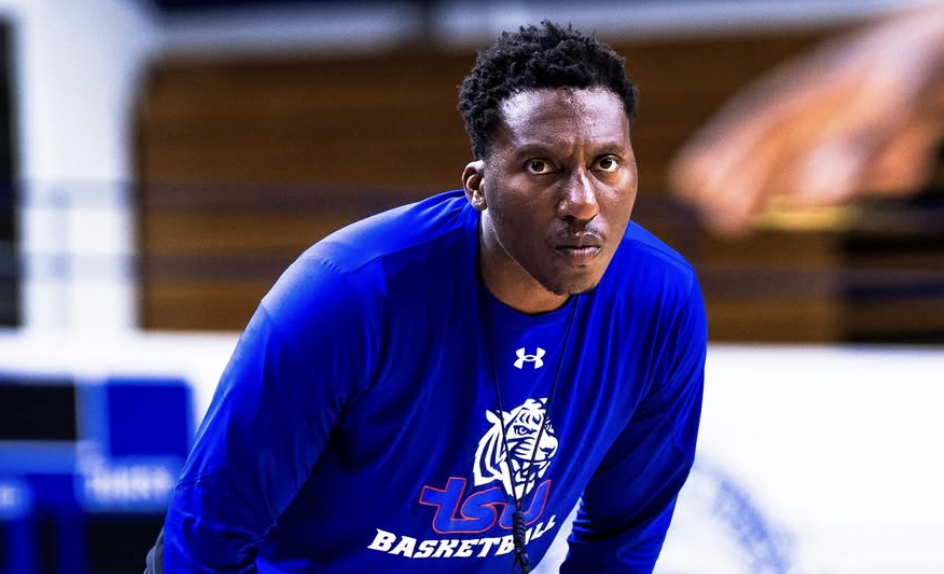
There Smith stands rifling 3-point shots up in an empty Gentry Center when two players pop out of the weight room asking him if they need to hault their workout. For the past five or so minutes, the sound of the arena’s fire alarm had invaded every inch of the building.
It was business as usual for Smith’s team, though. Once they got the all clear, they ducked back into the weight room before finishing their lift and ultimately heading to the locker room a few minutes before their set practice time on an October Tuesday.
“Welcome to Tennessee State,” says an onlooker as each player walks on to the arena floor with the fire alarm still blaring. Some do interviews through the noise, some talk amongst themselves, some just shoot around. None are rattled.
“Not the first time,” Harper says of the alarm, “We’re used to this.”
As Tennessee State’s players ramp up for practice, they’re told to evacuate the Gentry Center and each pace out of the arena as if they know it’s a false alarm. While Smith’s team was supposed to be beginning its practice with a secret scrimmage against Lipscomb on the horizon, it was standing outside of the arena waiting for the firefighters on scene to give them the all clear to head back inside and get to work.
In the following moments, a group of seven or eight firefighters walks out of the arena and is bombarded by a group of players respectfully asking if they can go inside the gym. A firefighter throws his hands up as if he’s been defeated and doesn’t say a word.
Eventually Smith’s team re-enters the practice floor and gets to work with no excuses as if the alarm incident never occurred. This program could have plenty of reasons to cite for poor performance–including groups of non-student athletes taking up the practice floor late at night when players need to work out, facilities that likely don’t stack up to some of its peers and a lack of funding–but this group isn’t dwelling on what it doesn’t have.
“There’s challenges everywhere,” Smith said. “This school has history, has great coaches on this campus, some legends, NFL players and WNBA players. There’s a lot of history on this campus and legacy on this campus from the staff standpoint, but even all over the campus. It’s a big-time university that I’m proud to be a part of and everybody here wants to win. That’s the biggest thing for me, everybody wants to win.”
Say what you will about Tennessee State, but nobody can say it doesn’t mean something. Those who know Tennessee State are passionate about it and want to see it become a winner. The school Smith inherits the head coaching job at is one of America’s most prominent historically black universities and is hungry for a winner.
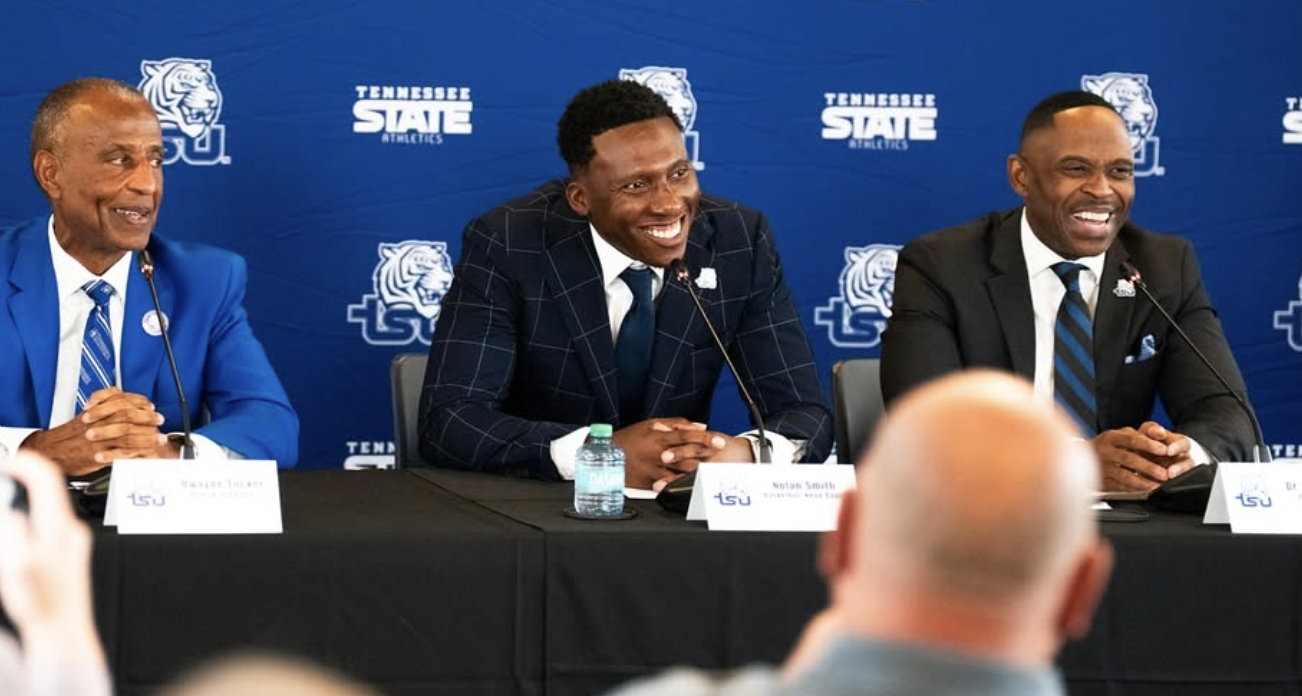
As Smith’s team enters his first season at the helm, it’s about more than them. It’s about spotlighting a Nashville community.
“We definitely take pride in it,” London said in regard to the identity of the school. “It would be legendary to leave a mark at a special school. With everything going on I feel like it would be a great story.”
The story would be easy for national crews to craft for this Tennessee State team if it makes it to its ultimate destination, it lost its head coach and could’ve been declared dead in the summer. If it makes the NCAA Tournament, it would be one of college basketball’s premier stories of resilience.
Tennessee State is ranked third in most speculatory OVC preseason polls and feels as if it has a real chance at finding its way into the spotlight. It’s got the go-to guys in Nkrumah and Harper. It’s got the point guard play with former Georgetown, Virginia and Memphis guard Dante Harris as well as London. It’s got depth in 6-foot-8 forward Antoine Lorick and 6-foot-5 wing Carlous Williams.
Ever since Smith met with each player individually in the days following his arrival on Tennessee State’s campus, he heard a resounding message similar to the one that his players still articulate in mid October. It was almost jarring for the first-time head coach to walk into each meeting, sit down and shy away from talking about individual goals in favor of bringing a team goal to light.
Since then, Smith has made sure that his group knows exactly where the last championship banner hangs and the year that this program last played on the nation’s biggest stage.
“He always reminds us that that’s the last time we won and that we’re going to make history here,” Harper said. “We’ll accomplish something new with a conference championship and everybody is bought into that same goal.”
A tournament berth for this program in year one of Smith’s tenure would put it among the program’s greatest teams, as well. Since its last tournament berth in 1994, Tennessee State has gone through seven head coaches, has played 928 games and has gone through 31 full seasons. No coach has ever taken this program to the big dance in the first year of his tenure.
Countless members of this program have had similar visions of a winning culture to the one Smith possesses, but most have packed up their bags and left the Gentry Center for good without reaching the mountaintop. So have eventual NBA players like Robert Covington and Tahjere McCall.
For some it’s been a result of a lack of player personnel. Some have been hampered by a lack of resources. Perhaps Smith’s pedigree, optimism and the program’s current state can allow him to be the one to rewrite history.
“I think Nolan is one of the up and coming young coaches out there that’s really good,” Payne–a current Arkansas assistant–told Basket Under Review. “He’s gonna be very successful there. A great to his coaching career, getting a head coaching job early and Tennessee State got a good one. It seems like they are really excited and like they are really going to support him and give him what he needs to be successful.”
Payne’s last line comes across to an untrained observer as coach speak or rather insignificant, but it’s one that those familiar with this Tennessee State program likely won’t take for granted.
If Smith truly is properly resourced in this role, he’s got a chance. Even if he’s not, he’s not backing away from his goals. Smith got into this to influence young lives, but only one thing would constitute a successful year one in his mind.
Time to see if he can bring life into a program that’s been starved of college basketball’s biggest stage.
“It would mean everything,” Smith said of a potential NCAA Tournament berth . “With the history here and what they did many moons ago, this place has great history within this basketball program and it’s to honor guys like Anthony Mason, Robert Covington, it’s important for our players to know the history of the school, but also the basketball program. To bring a championship back here would mean everything to us. That’s the goal.”

